- Region
- Vega baja
- Marina Alta
- Marina Baixa
- Alicante
- Baix Vinalopo
- Alto & Mitja Vinalopo
-
ALL TOWNS
- ALICANTE TOWNS
- Albatera
- Alfaz Del Pi
- Alicante City
- Alcoy
- Almoradi
- Benitatxell
- Bigastro
- Benferri
- Benidorm
- Calosa de Segura
- Calpe
- Catral
- Costa Blanca
- Cox
- Daya Vieja
- Denia
- Elche
- Elda
- Granja de Rocamora
- Guardamar del Segura
- Jacarilla
- Los Montesinos
- Orihuela
- Pedreguer
- Pilar de Horadada
- Playa Flamenca
- Quesada
- Rafal
- Redovan
- Rojales
- San Isidro
- Torrevieja
- Comunidad Valenciana


- EDITIONS:
 Spanish News Today
Spanish News Today
 Murcia Today
Murcia Today
 Andalucia Today
Andalucia Today
article_detail
Spanish News Today Editors Roundup Weekly Bulletin Sept 13
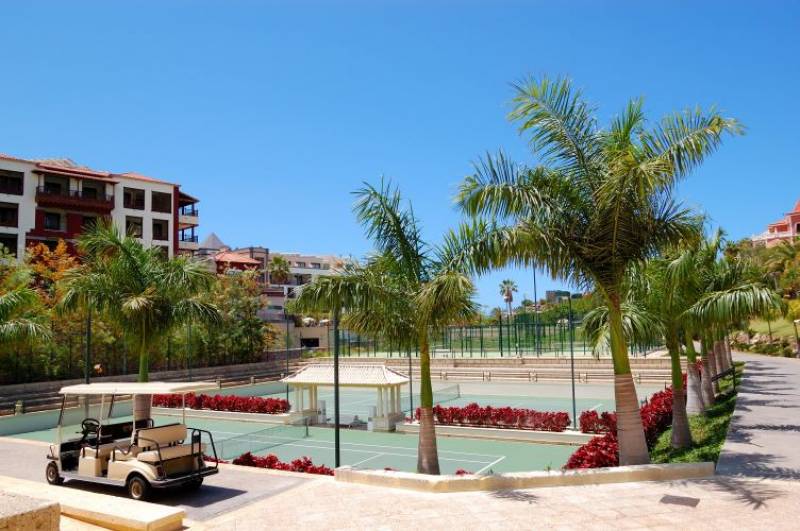
TOP STORIES: "Changes to urbanisation and community rules with the Horizontal Property Law" & "Why the new employment rights for cleaners are important to you"
Happy Friday 13th everybody! Unlucky for some, but not for the Spanish because, if you remember, they consider only Tuesday 13th to be an unlucky day. So you’re safe from being crushed by falling pianos or falling down manholes if you’re on Spanish soil.
This week, we’ve got news for you of a couple of little changes coming into various Spanish laws which affect workers, employers and property owners, plus our usual mix of local stories from Murcia, Alicante, Andalucía and the Islands.
No-little affair

There has also been an update this week on the latest in the Nolotil case. Nolotil is a commonly used painkiller in Spain (brand name for the drug metamizole) but has sparked controversy over the years due to its potential life-threatening side effect, agranulocytosis, a condition causing a severe drop in white blood cells.
Agranulocytosis from taking Nolotil is an issue that, for whatever reason, has disproportionately affected foreigners, particularly British residents and tourists in Spain. Well, despite all these concerns, regulatory bodies such as the European Medicines Agency (EMA) and the Spanish Agency for Medicines and Health Products (AEMPS) have just concluded that the benefits of having Nolotil on the market outweigh its risks, much to the frustration of those advocating for stricter safety measures.
Groups like the Spanish Association of People Affected by Drugs (ADAF) have been pushing for greater caution, arguing that agranulocytosis is unpredictable and can strike regardless of dosage, previous tolerance or nationality. In fact, the last victim to die from Nolotil-induced agranulocytosis was a Spaniard, barely a month ago!
A law firm representing over 400 affected individuals has submitted cases to Spain’s National High Court, while the Public Prosecutor’s Office is investigating possible health liability and ADAF, despite this recent legal setback, remains committed to continuing the fight.
While agranulocytosis is rare, its unpredictability has left many patients feeling vulnerable, and the legal battle for justice and safer drug regulation continues, with advocates criticising the regulatory bodies for prioritising keeping the drug on the market over patient safety.
As always, money talks, and the best way of making one’s voice heard in a capitalist economy is by removing investment from products you don’t agree with. Put simply, if Nolotil ceases to be profitable for drug manufacturers, they will stop making it. So please, everyone, do not buy or take Nolotil. There are other painkillers out there which are less dangerous!
Cleaning house

This week, the Spanish government passed a long overdue decree to recognise several new labour rights for domestic workers. This is a huge step forward for this group, which consists mostly of women and wasn’t even afforded the same severance pay as other employees until a few short years ago.
Working in someone else’s home is a challenging job and since so many domestic staff are employed by private citizens, it’s a sector that’s difficult to control and so has been somewhat neglected until now. If you work as a cleaner, pay someone to clean your home for you or know someone who does, this is something you should really be aware of.
The new legislation aims to protect home-based employees in a number of important ways, but there are 5 key points worth mentioning:
- Occupational risk assessments: Employers must identify and mitigate risks associated with domestic work, and the government will provide a template to help with this process.
- Adequate protective equipment: Employers must provide suitable equipment, including personal protective gear, to minimise risks.
- Refusal to work in case of serious risk: Employers must inform workers of potential risks and allow them to stop work or leave the premises if necessary, without penalty.
- Protection against violence or harassment: Domestic workers are now protected against physical violence, harassment and abuse, including on the basis of skin colour, nationality, sex or sexual orientation. A plan to prevent and address these situations will be created within a year.
- Free medicals: Domestic workers will be entitled to a free annual medical examination to identify potential health risks, paid for by the National Health System.
These measures aim to improve the working conditions and protect the rights of domestic workers, who have historically been vulnerable to exploitation and mistreatment.
Lateral thinking

Let’s get legal with it, now. Have you ever heard of the Horizontal Property Law?
No, Spain’s ‘Ley de Propiedad Horizontal’ does not mean you have to be lying down when you sign the deeds to the house you’re buying. Rather, the Horizontal Property Law outlines rules for coexistence and harmony in communities of owners.
Whether you live in an apartment building, small street of detached homes or on a residential urbanisation or resort, it is this Law which covers the key procedures for the community, such as the election of community presidents, how homeowners’ meetings are convened, how disputes between neighbours are handled and what kinds of property alterations are permitted.
Now, a proposed amendment to the Horizontal Property Law could soon bring significant changes to how community meetings in resorts and urbanisations are conducted. The amendment, part of the Royal Decree - Omnibus Law, aims to modernise and streamline the legal framework that governs relations between property owners, responding to long-standing requests from associations of property administrators, particularly when it comes to digitalisation.
To be specific, the proposals include the introduction of electronic communication between property owners and administrators, enabling homeowners to attend community meetings and AGMs via videoconference and allowing for joint meetings. Additionally, the amendment suggests the digitalisation of minute books, helping to bring community management into the digital age.
Beyond technological updates, other changes focus on simplifying the decision-making process at meetings. For example, the amendment proposes easing the majority requirements for certain types of agreements and clarifying that agreements become legally binding immediately after they are adopted. It also seeks to extend the deadline for preparing meeting minutes from 10 calendar days to 20 working days and clarifies the process for calling a general meeting by a group of 25% of property owners.
Property administrators have welcomed all these proposed changes, which are to be voted on by Spanish parliament in the coming days, so watch this space.
Murcia
Strange, but there seems to be a theme of theft in its different forms running through the Murcia stories we have to bring you this week.
The first concerns unlicensed holiday rentals in the Region. A new study has found that between January and August 2024, no fewer than 421 illegal holiday homes were being advertised on major online platforms like Booking.com.
While this figure has dropped slightly from 2023’s total, it’s still concerning. Fines for property owners range from 20,001 to 40,000 euros if they’re operating a short-term holiday let without the proper licences, and tourists could face the risk of arriving to find their accommodation shut down, forcing them to find alternatives.
To combat this, Murcia authorities are working with Booking.com and the other platforms to remove unlicensed listings and enforce regulations to improve safety and quality. In fact, by 2026 there is supposed to be legislation coming in at the European level that will require these platforms to verify licences before allowing adverts to go live, which should further curb the issue of illegal holiday homes.
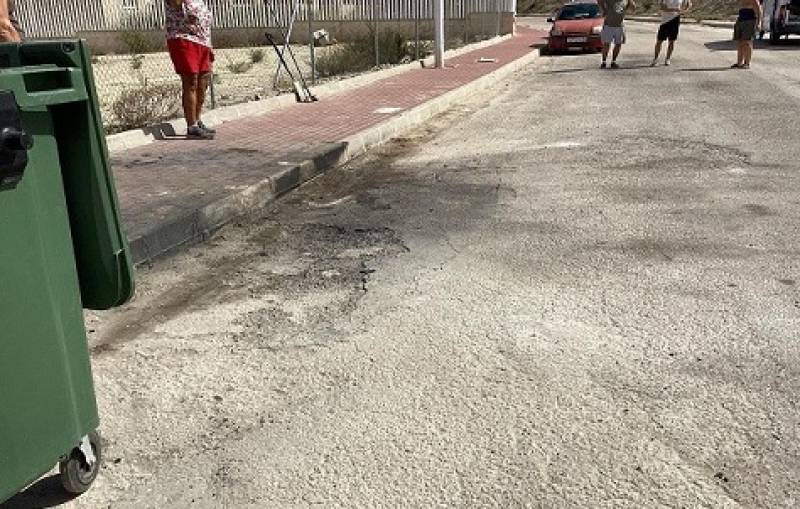 Meanwhile, theft and destruction in a different form have been causing concern in Puerto de Mazarrón and Camposol, where a spate of vandalism has seen rubbish bins set on fire. In early September, several bins in both areas were destroyed in acts of mindless vandalism.
Meanwhile, theft and destruction in a different form have been causing concern in Puerto de Mazarrón and Camposol, where a spate of vandalism has seen rubbish bins set on fire. In early September, several bins in both areas were destroyed in acts of mindless vandalism.The local community quickly rallied, with volunteers from the Camposol Free Community Sports group cleaning up the mess. Coincidentally, this occurred just as extra bins were being distributed in Camposol as part of an initiative to improve waste collection, so nothing gained, nothing lost, really.
Another distressing incident of theft, but with much graver consequences, has occurred in the Mar Menor, where 23 juvenile nacras – a critically endangered species of giant fan mussel – were stolen from the lagoon.
Sadly, the nacra has been in decline due to a parasite that has wiped out populations across the Mediterranean, though it wasn’t so many weeks ago in this Bulletin when we brought you the glad tidings that populations of these mussels were slowly starting to grow, an excellent achievement for Murcia and a sign of the improving state of the water in the Mar Menor.
But now, with someone stealing these animals – which can grow up to a whopping 1.5 metres when they become adults – conservation efforts could be severely set back for these important creatures, which play a vital role in maintaining the health of the Mar Menor’s ecosystem.
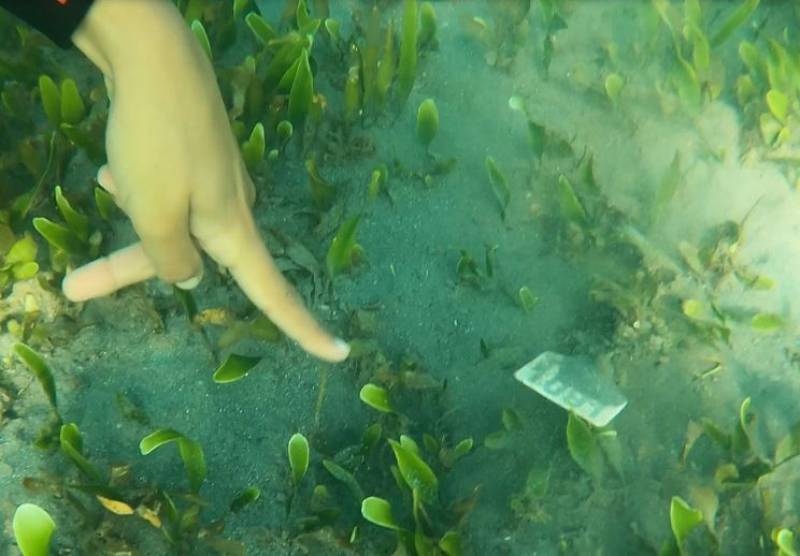 Okay, so granted that on a philosophical level theft is often considered a crime only because we view material objects and, in this case, even living creatures as personal property. If everything was seen as having its own existence and was respected as an individual entity, we wouldn’t necessarily perceive the use or enjoyment things as stealing.
Okay, so granted that on a philosophical level theft is often considered a crime only because we view material objects and, in this case, even living creatures as personal property. If everything was seen as having its own existence and was respected as an individual entity, we wouldn’t necessarily perceive the use or enjoyment things as stealing.From a practical point of view, authorities in Murcia are being less forgiving, and with fewer than 500 healthy adult nacras left in the Region, their theft from a no-go area is being treated as a serious offence punishable by up to two years in prison. Authorities are also working to ban boats from other parts of the lagoon to further protect the species.
In light of these distressing incidents of property damage and theft, it’s heartening to know that there are still ways to give back. Friends of the Bone Cancer Research Trust in the UK are asking for help to collect used stamps to raise money for life-saving cancer research.
By simply donating stamps, old coins or obsolete currencies (they are especially interested in overseas donations from outside the UK), you can contribute to efforts to find a cure for primary bone cancer, which disproportionately affects children, teenagers and the elderly. This small act of giving can make a big difference in the fight against this devastating disease.
 Finally, for those around the Murcia area this weekend, there are a couple of emotional exhibitions to visit that also tie into the theme of unjust loss, in this case of life. One is by artist Lidó Rico, whose works on display in Mazarrón’s Casas Consistoriales pay tribute to the miners who lost their lives working in the area’s mines during the 19th and 20th centuries.
Finally, for those around the Murcia area this weekend, there are a couple of emotional exhibitions to visit that also tie into the theme of unjust loss, in this case of life. One is by artist Lidó Rico, whose works on display in Mazarrón’s Casas Consistoriales pay tribute to the miners who lost their lives working in the area’s mines during the 19th and 20th centuries.Another, in Murcia City, features photographs by María Tomás Rodríguez, focusing on the tragic loss of life along the Canary Route, a dangerous migratory path from Africa to Europe. Her exhibition sheds light on the invisible deaths of migrants who risk everything to escape poverty, with the hope that increased cooperation with these countries could reduce the need for such perilous journeys.
This is the last weekend you can catch both of these exhibitions, but as you know there is still loads more going on around the Region of Murcia, including the last weekend of the Feria in Murcia city and much more…
See our EVENTS DIARY for more events and activities coming up soon in the Region of Murcia:
Spain
It’s been one of those weeks where holidaymakers have got a bit carried away again and indulged in one too many bevvies, creating chaos in the air and narrowly avoiding death on land – well, kind of on land.
You know those enormous cranes that dot the skyline throughout Spain, towering over the buildings? That’s right, the ones that make you wonder how on earth people have the guts to climb one every day as part of their jobs. Well, one French tourist found plenty of ‘Dutch courage’ during a recent trip to Ibiza and decided it would be a good idea to scale to the top in nothing but his swimming trunks.
Dozens of people in the Puig de Molinas area of the famous party island literally stopped in their tracks when they spotted the young foreigner staggering and swaying out along the arm of the crane, several storeys above the street.
Tons of calls were made to the emergency services warning that the holidaymaker was “in danger” of toppling to his death from the huge machine and the Local Police sped to the building site. However, even as firefighters were readying their equipment to climb up and rescue the man, he calmly began making his own way down without a care in the world.

He was met on the ground by the less-than-amused officers, who issued a stern reprimand and escorted him back to his hotel to sleep it off.
Unsurprisingly, a police spokesperson pointed out that the French man showed “clear symptoms of intoxication.”
Oh, by the way all of this drunken drama unfolded before noon.
Turn your eyes even further skyward, now, for the latest debacle aboard a Ryanair plane. Last weekend, a scrap broke out between a man and a woman en route to – you guessed it – Ibiza from Manchester and the pilot made the call to detour to Toulouse in France so the pair could be removed by police.
Of course, this meant that a plane full of eager holidaymakers had a frustratingly delayed start to their vacations.
At the time, a Ryanair spokesperson simply said that a man and a woman were escorted off the plane by local police after becoming “disruptive” and “unruly” mid-air. But it later transpired that the man, who had enjoyed a tipple or two, became angry when he thought his wife was flirting with a stag party on board.
Ah, the power of drink.
But it’s exactly this incident and ones like it that have prompted outspoken Ryanair boss Michael O’Leary to take to the airwaves again demanding stricter alcohol controls at airports. While his airline has resorted to searching the bags of all passengers boarding flights to Ibiza after a few were caught smuggling on vodka in water bottles, he’s asking that bar staff on the ground serve booze more responsibly.
“We don’t want to begrudge people having a drink. But we don’t allow people to drink-drive, yet we keep putting them up in aircraft at 33,000 feet. As long as they can stand up and shuffle they will get through. Then when the plane takes off we see the misbehaviour,” he said.
These sky-high shenanigans are sadly nothing new and are hardly surprising anymore, but you might be surprised to learn that several grown adults, and respected politicians at that, are in the middle of a cross-border fight over a lump of rock. In fact, this bit of concrete in question nearly sparked an international incident a few years ago and now it’s reignited an ugly dispute between Gibraltar and Spain.
It all started back in 2013, when a rogue Spanish politician, Javier Ortega Smith, decided to go all ‘Mission Impossible’ and steal a concrete block from an artificial reef off the coast of Gibraltar. The reef was created to keep Spanish fishermen from working in the area, and Ortega Smith, being the secretary general of the Vox party, took it upon himself to stage a daring underwater heist.
Fast forward to the present, and it seems that Gibraltar is still mighty miffed about the whole ordeal. In fact, they’re so annoyed about the theft that they’ve issued a renewed demand for the return of the pilfered block, which has been proudly displayed at the Vox party’s HQ in Madrid since its, ahem, ‘acquisition’.
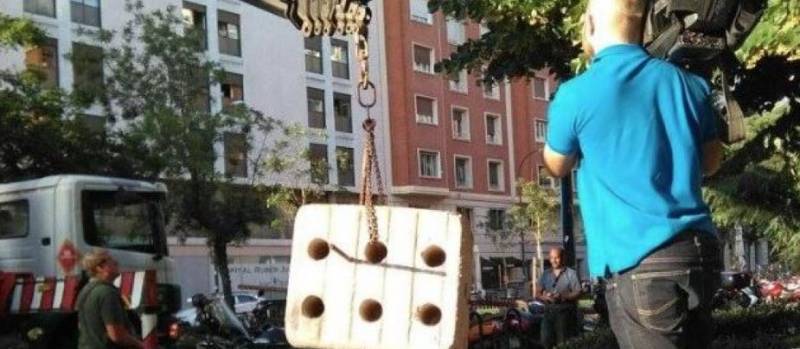
Gibraltar’s Chief Minister, Fabian Picardo, has been vocal about his desire to get the block back, stressing that it was paid for by the good people of Gibraltar. But Ortega Smith is having none of it, taunting Picardo with a cheeky “if you dare, come and get it yourself” on social media.
The dispute has done little to ease tensions between Gibraltar and Spain, with a November deadline looming for high-level talks aimed at signing a treaty over the future of Gibraltar following Brexit.
Alicante
A 19-year-old Lithuanian motorist took the phrase ‘making a splash’ to a whole new level when he drove his car head-first into the kiddie pool at the Hotel Torrejoven in Torrevieja.
Eyewitnesses claim the young driver was speeding down the street before he ploughed through the hotel’s exterior wall, flattened several sunbeds and landed in the shallow pool with a resounding splosh.
The scene drew many bemused onlookers but the bizarre crash could have ended in tragedy had it happened a few hours earlier. The popular family hotel was packed with guests but since the accident occurred at around 8pm, the poolside was miraculously deserted.
In the end, the only casualties were the sun loungers that got mowed down like dominoes.
The driver himself walked away from the crash without a scratch. He was, however, given a breathalyser test by the Local Police, which revealed a rather impressive (but not in a good way) blood alcohol level of 1.17 mg/l. That’s four times over the (current) limit.
The car remained in the pool until Sunday, when it was finally fished out, leaving hotel guests without access to the pool for the entire weekend. But hey, at least it made for a great spectator sport for curious onlookers!
Mosquitoes and summer in Spain unfortunately go hand in hand but apart from being super annoying, these critters are known to carry more than 20 exotic diseases, including West Nile Virus, dengue fever and yellow fever.
The Asian tiger mosquito, a recent enough arrival, has seen its population surge in recent years. To combat this growing problem, the Valencian government is taking an unconventional approach: releasing hundreds of thousands of sterile male mosquitoes into the environment in Alicante.
These male mosquitoes, which do not bite, will mate with female mosquitoes, preventing them from producing offspring. This method, known as the Sterile Insect Technique (SIT), has already been successfully tested in Valencia and Castellón, reducing the tiger mosquito population by up to 80% since its introduction in 2016.
Now, the plan is to expand this programme to the Costa Blanca, but it probably won’t be rolled out until next year.
It’s worth noting that this approach is considered completely humane as it doesn’t harm the mosquitoes, and it’s being explored alongside other natural remedies.
One promising study involves increasing the presence of naturally occurring bacteria in tiger mosquitoes, making their eggs non-viable without killing the insect.
More importantly, these techniques may also be applied to common mosquitoes, which are responsible for spreading the West Nile virus, a disease that has claimed six lives in southern Spain this summer and put another elderly woman in hospital just this week.
Imagine, as a young child, being given the chance to be a part of history. That’s exactly what’s on offer to schools and other educational centres across the globe thanks to PLD Space, a trailblazing company from Elche that wants youngsters to launch their own experiments into space – and it’s absolutely free.
Building on the success of their 2023 launch of the Miura 1, the first private rocket developed and launched in Europe, PLD Space is now giving schools the opportunity to send small satellites into space as part of their ‘Miura 5 Spark’ Programme.
The Spark project coincides with two upcoming demonstration launches of the Miura 5 rocket, scheduled for late 2025 and early 2026.
Schools of all levels – from primary to university – are invited to design and develop innovative, unique and creative scientific and technological projects that can be launched on the Miura 5 rocket.
The contest is open to schools worldwide, but Spanish experiments get priority, followed by EU and NATO member states.
The selected student teams will get to work with industry experts and see their projects come to life. Talk about a dream come true.
If you’re looking for something to do around Alicante this weekend, try the Rock Against Cancer (RAC) charitable rock festival in Torrevieja, which is being held this Friday and Saturday with the greatest rock tribute bands in Spain and Europe playing to raise money for cancer research.
Check out the Costa Blanca What’s On and Where to Go Facebook group to see more things to do around Alicante province!
Andalucía
 There’s some exciting news for travellers this winter – a new high-speed train route is set to connect Málaga and Barcelona, making travel between these two iconic cities faster and easier than ever.
There’s some exciting news for travellers this winter – a new high-speed train route is set to connect Málaga and Barcelona, making travel between these two iconic cities faster and easier than ever.From December 15, Iryo’s AVE trains will be zipping between the northeast of Spain and Andalucía, with two daily frequencies (one in each direction), seven days a week. With stops in Zaragoza, Madrid and Córdoba, this 5-hour-and-50-minute journey will offer a comfortable, speedy alternative to other long-haul options.
For those already planning their holidays or work trips, tickets are on sale now, with prices starting at a competitive 24 euros for a one-way trip. The new route follows on the heels of Iryo’s successful Barcelona-Sevilla connection launched in 2023, which also brought relief to those frustrated by lengthy travel times.
And it’s not just this service that’s getting people excited. Iryo has already released 70% of its tickets for 2025, ensuring passengers can lock in their journeys well in advance. Compared to some of the more cumbersome rail journeys in Spain, like the Málaga-Murcia route, which shockingly takes nearly 7 hours due to detours via Madrid, this new connection is a breath of fresh air for those seeking to get across Spain more quickly.
Now, speaking of great distances, did you know that Andalucía holds the claim for the largest man-made construction visible from space? Forget the Great Wall of China – the myth about the Great Wall being visible from space is simply untrue; in reality, the wall is too narrow and blends into its surroundings because it was made from the same material as is around it.
Some people claim that the pyramids of Egypt can be seen from space, though experts continue to debate this. No, NASA has this week confirmed that the biggest thing humans have made that can be seen from space is actually the so-called “Sea of Plastic” greenhouses in the province of Almería.
These expansive greenhouses, stretching over 28,500 hectares around El Ejido, are in one sense a testament to Andalucía’s agricultural might – most of the tomatoes, peppers, cucumbers and other fresh produce that Spain consumes are grown here – and pretty much everyone who lives in the area is involved in the trade in some way or other, so it’s a real engine for local commerce.
But for anyone who has ever been there, who has driven along the coastal road around the outskirts of Almería capital city, you will know that it’s an incredibly ugly sight. Miles and miles of white plastic sheeting that cover the crops, gently flapping in the wind.
The reason they’re so noticeable and can be seen from space is due to the sunlight reflecting off the white plastic sheets, creating a striking, bright white mass that stands out against the landscape. From a distance, you could even believe it’s snow.
While the ‘Mar de Plástico’ might be the most visible, it’s not alone in being spotted from space. Other notable landmarks include the Bingham Canyon mine in the US, Dubai’s Palm Jumeirah, and China’s Three Gorges Dam, are also visible, sparking debates over which human-made structures really dominate the Earth’s view from space.
Still, a claim to fame for southern Spain as being up there among the top 5, at least!
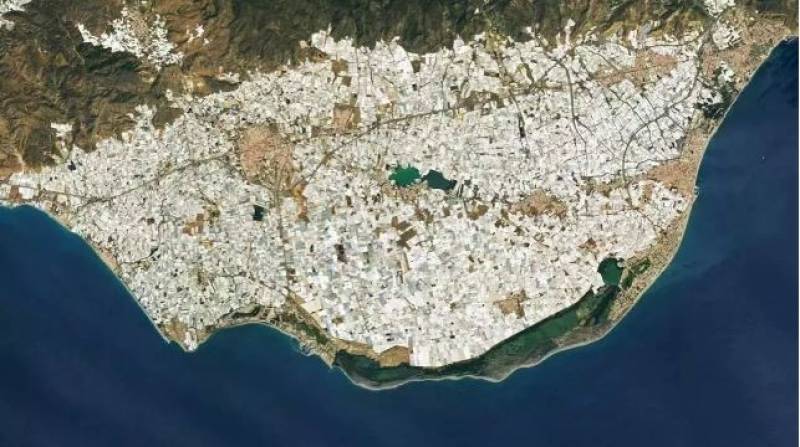
You may have missed…
- EU visitors to the UK will need to apply for this travel permit from next year.
The UK government has just announced that from April 2025, everyone travelling from the EU to the United Kingdom for tourism purposes will have to apply for an Electronic Travel Authorisation (ETA), mirroring the EU's ETIAS system it is bringing in. - A virtual battery service for your home solar set-up? Yes, it’s possible!
Want to make the most of your solar energy production? A virtual battery service could offer you an opportunity to optimise your investment in solar panels. - The stats for Corvera Airport summer flights are in and here’s how Murcia fared in 2024.
The latest flight and passenger stats for the Region of Murcia International Airport have been released by airports manager Aena, and it's a bit of a mixed blessing for Murcia this summer. - Get paid a salary while claiming unemployment benefits: How Spain hopes to get those on the dole back into work.
From next year, workers in Spain will be able to combine their salary with unemployment benefits, receiving both payments at the same time to help long-term unemployed individuals reintegrate into the labour market. - Spain considers lowering drink driving limits for all motorists.
The Spanish government is considering lowering the blood alcohol limit for drivers, with the aim of reducing road accidents. The Minister of the Interior, Fernando Grande-Marlaska, has announced plans to reduce the limit from 0.5 grams per litre of blood to 0.2 grams per litre for all motorists.
And that’s this week’s news roundup for you. Thanks a lot for reading, and there’ll be another for you next week.
Bye!
Contact Murcia Today: Editorial 000 000 000 /
Office 000 000 000





















